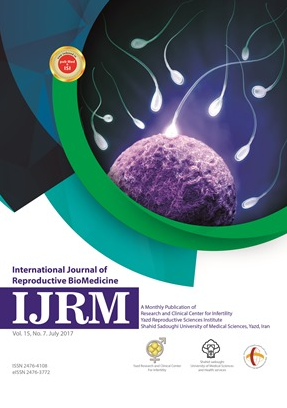
International Journal of Reproductive BioMedicine
ISSN: 2476-3772
The latest discoveries in all areas of reproduction and reproductive technology.
The incidence rate of unresponsive thin endometrium in frozen embryo transfer cycles: A case-series of therapy with granulocyte colony stimulating factor
Published date: Dec 31 2019
Journal Title: International Journal of Reproductive BioMedicine
Issue title: International Journal of Reproductive BioMedicine (IJRM): Volume 17, Issue No. 12
Pages: 923–928
Authors:
Abstract:
Background: Treatment-resistant thin endometrium (TTE) during in-vitro fertilization is a relatively uncommon and challenging problem.
Objective: The primary aim of the study was to assess the TTE rate during frozen embryo transfer (FET) cycles and the secondary aim was to evaluate the effect of intrauterine instillation of granulocyte colony stimulating factor (G-CSF) in these cases.
Materials and Methods: In this cross-sectional study, all of the women who underwent FET cycles with hormonal endometrial preparation in Royan Institute from June 2015 to March 2018 were evaluated and all of the cases with TTE diagnosis (endometrial thickness < 7 mm after using high doses of estradiol) were included. In the eligible cases, 300 μgr of G-CSF was infused intrauterine. If the endometrium had not reached at least a 7-mm, a second infusion was prescribed within 48 hr later.
Results: During the study, 8,363 of FET cycles were evaluated and a total of 30 infertile patients (0.35%) with TTE diagnosis were detected. Finally, 20 eligible patients were included. The changes of endometrial thickness after G-CSF therapy were significant (p< 0.001); however, the endometrial thickness did not reach 7 mm in nine patients (45%) and the embryo transfer was canceled.
Conclusion: It was found that the rate of TTE during the FET cycle is very low and intrauterine perfusion of G-CSF has a potential effect to increase the endometrial thickness in these patients; however, the rate of cancellation was still high and poor pregnancy outcomes were observed.
Key words: Granulocyte colony-stimulating factor, Cryopreservation, Embryo transfer, Endometrial diseases.
References:
[1] Mouhayar Y, Sharara FI. Modern management of thin lining. Middle East Fertility Society Journal 2017; 22: 1–12.
[2] Kasius A, Smit JG, Torrance HL, Eijkemans MJ, Mol BW, Opmeer BC, et al. Endometrial thickness and pregnancy rates after IVF: a systematic review and meta-analysis. Hum Reprod Update 2014; 20: 530–541.
[3] Li Y, Pan P, Chen X, Li L, Li Y, Yang D. Granulocyte colony-stimulating factor administration for infertile women with thin endometrium in frozen embryo transfer program. Reprod Sci 2014; 21: 381–385.
[4] Gleicher N, Vidali A, Barad DH. Successful treatment of unresponsive thin endometrium. Fertil Steril 2011; 95: e13–17.
[5] Garcia-Velasco JA, Acevedo B, Alvarez C, Alvarez M, Bellver J, Fontes J, et al. Strategies to manage refractory endometrium: state of the art in 2016. Reprod Biomed Online 2016; 32: 474–489.
[6] Kunicki M, Łukaszuk K, Liss J, Skowrońska P, Szczyptańska J. Granulocyte colony stimulating factor treatment of resistant thin endometrium in women with frozen-thawed blastocyst transfer. Syst Biol Reprod Med 2017; 63: 49–57.
[7] Rutella S, Zavala F, Danese S, Kared H, Leone G. Granulocyte colony-stimulating factor: a novel mediator of T cell tolerance. J Immunol 2005; 175: 7085–7091.
[8] Scarpellini F, Sbracia M. Use of granulocyte colony-stimulating factor for the treatment of unexplained recurrent miscarriage: a randomised controlled trial. Hum Reprod 2009; 24: 2703–2708.
[9] Würfel W, Santjohanser C, Hirv K, Bühl M, Meri O, Laubert I, et al. High pregnancy rates with administration of granulocyte colony-stimulating factor in ART-patients with repetitive implantation failure and lacking killer-cell immunglobulin-like receptors. Hum Reprod 2010; 25: 2151–2152.
[10] Santjohanser C, Knieper C, Franz C, Hirv K, Meri O, Schleyer M, et al. Granulocyte-colony stimulating factor as treatment option in patients with recurrent miscarriage. Arch Immunol Ther Exp 2013; 61: 159–164.
[11] Agerholm I, Loft A, Hald F, Lemmen JG, Munding B, Sørensen PD, et al. Culture of human oocytes with granulocyte-macrophage colony-stimulating factor has no effect on embryonic chromosomal constitution. Reprod Biomed Online 2010; 20: 477–484.
[12] Gleicher N, Kim A, Michaeli T, Lee HJ, Shohat-Tal A, Lazzaroni E, et al. A pilot cohort study of granulocyte colony-stimulating factor in the treatment of unresponsive thin endometrium resistant to standard therapies. Hum Reprod 2013; 28: 172–177.
[13] Barad DH, Yu Y, Kushnir VA, Shohat-Tal A, Lazzaroni E, Lee HJ, et al. A randomized clinical trial of endometrial perfusion with granulocyte colony-stimulating factor in in vitro fertilization cycles: impact on endometrial thickness and clinical pregnancy rates. Fertil Steril 2014; 101: 710–715.
[14] Tehraninejad E, Davari Tanha F, Asadi E, Kamali K, Aziminikoo E, Rezayof E. G-CSF intrauterine for thin endometrium, and pregnancy outcome. J Family Reprod Health 2015; 9: 107–112.
[15] Lee D, Jo JD, Kim SK, Jee BC, Kim SH. The efficacy of intrauterine instillation of granulocyte colony-stimulating factor in infertile women with a thin endometrium: A pilot study. Clin Exp Reprod Med 2016; 43: 240–246.
[16] Kunicki M, Łukaszuk K, Woclawek-Potocka I, Liss J, Kulwikowska P, Szczyptańska J. Evaluation of granulocyte colony-stimulating factor effects on treatment-resistant thin endometrium in women undergoing in vitro fertilization. Biomed Res Int 2014; 2014: 913235.
[17] Xu B, Zhang Q, Hao J, Xu D, Li Y. Two protocols to treat thin endometrium with granulocyte colony-stimulating factor during frozen embryo transfer cycles. Reprod Biomed Online 2015; 30: 349–358.
[18] Eftekhar M, Sayadi M, Arabjahvani F. Transvaginal perfusion of G-CSF for infertile women with thin endometrium in frozen ET program: A non-randomized clinical trial. Iran J Reprod Med 2014; 12: 661–666.
[19] Al-Ghamdi A, Coskun S, Al-Hassan S, Al-Rejjal R, Awartani K. The correlation between endometrial thickness and outcome of in vitro fertilization and embryo transfer (IVF-ET) outcome. Reprod Biol Endocrinol 2008; 6: 37–41.
[20] Check JH, Choe JK, Summers-Chase D. Failure to increase the thickness of thin endometria with intrauterine infusion of granulocyte colony stimulating factor (G-CSF). Clin Exp Obstet Gynecol 2016; 43: 332–333.